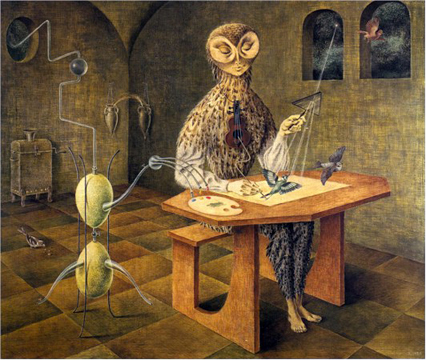Double Edge
Friday, February 23rd, 2007
 |
||||||
|
|
|
|
|
|
|
|
Astrogator's LogsNew Words, New Worlds |
 |
| Artist, Heather Oliver |


Remedios Varo: Creation of the Birds
Like all art, writing places harsh and divergent demands on the writer. We first have to sit for long stretches in a silent, empty room, and there struggle with the work like Jacob with his angel. Then we must step back, examine our creation dispassionately, and ruthlessly alter whatever we think falls short. To venture into the wider world, we are required to do work that has little to do with inspiration, although it, too, requires passion. We must write proposals, send letters, find agents, listen to criticism and adapt both our expectations and the work in response to it. And if we manage to navigate through all these shoals, we must be prepared for a significant portion of readers to dislike our work.
Until the early 20th century most authors paid to have their works printed or printed them on their own small presses. In other words, such luminaries as the Brontë sisters and Virginia Woolf would be considered “vanity authors” by today’s definition. Now, with the advent of e-books, print on demand and online publications, the boundaries are starting to blur and shift again. At the same time, both writers and readers are getting increasingly isolated in non-overlapping online universes dedicated to smaller and smaller subgenres.
Given these circumstances, what defines a writer? I have read informal writing that is of better quality than published works. Also, given the atomization of today’s readership, few writers can make a living exclusively on their writing unless they are recognized geniuses or can write very fast (there is, too, the occasional random lucky hit of a best-seller). The traditional advice to aspiring writers — found once in private letters, now in public livejournals — is to keep writing, no matter what. Unquestionably, writing is among the most creative and constructive hobbies. However, I noticed that these exhortations tend to come from people who are already published in official venues and/or have independent incomes.
After giving the matter a good deal of thought, I concluded that a writer is someone who writes with the goal of publication. Amusingly, two formidable institutions, the IRS and the NIH (National Institute of Health), agree with me. The IRS allows deduction of writing-related expenses if the writer can show that s/he attempted to publish the work, regardless of success. The NIH (and all agencies that fund research) allow investigators to list only published works on their grants. The Brontë sisters agreed as well: unworldly though they were deemed to be, they mailed their stories to London publishers the moment they completed them.
Publication rarely brings fame and fortune, especially in today’s climate of soundbites and short attention spans. Its major boon is that it takes us out of the lonely room where we stretch ourselves on racks of agony and ecstasy, out of the tiny ponds where social interactions overwhelm the primary objective of writing. It gives us perspective, it keeps us grounded. And it allows us to consider a particular work finished — finished enough to let go, like a child that grew up and finally left home.
Note: An expanded, updated version of this essay has been reprinted at the Huffington Post with the title Southpaws: The Hops in Humanity’s Beer?
 Those who are, like me, left-handed and older than forty probably recall being forced to write with our right hand and the frustration of using many “handed” tools, including scissors, rulers and computer mice. We also remember being told that left handers are prone to depression, immune deficiencies, shorter lives, dyslexia and a host of other woes… and no wonder, given the drizzle of harassment! Finally, there is the conflation of left with evil, wrong or inept in practically all religions and languages (sinister, gauche, linkisch…), not to mention most political systems.
Those who are, like me, left-handed and older than forty probably recall being forced to write with our right hand and the frustration of using many “handed” tools, including scissors, rulers and computer mice. We also remember being told that left handers are prone to depression, immune deficiencies, shorter lives, dyslexia and a host of other woes… and no wonder, given the drizzle of harassment! Finally, there is the conflation of left with evil, wrong or inept in practically all religions and languages (sinister, gauche, linkisch…), not to mention most political systems.
The percentage of left handers hovers around 10% regardless of race and culture. The most common explanation for the persistence of the trait was that left-handed warriors had the element of surprise in primitive societies. As a result of this sneakiness, they survived long enough to leave a few like-handed descendants (notice that this explanation is exclusively male-oriented and also implies that the trait is dominant).
From my readings on the topic and my own awareness of what strengths and weaknesses I possess, I hit upon a slightly more flattering explanation for the persistence of the trait. Namely, I decided that left-handed people must be less lateralized in their thinking. This can lead (literally) to crossed wires — and hence to such outcomes as dyslexia and depression. But it can also lead to less mental compartmentalizing, more efficient multi-tasking, enhanced ability to see the big picture and to think across boundaries.
Results from recent tests in several neurobiological disciplines lend support to these speculations. Apparently, left handers do cluster at the extreme ends of the IQ range, the connections between the two sides of their brain are faster than in right handers, they often use both hemispheres for language and they excel at complicated tasks. So left handers may not just be a relic of barbaric times, after all. Instead, they may be the hops that add zest to humanity’s beer.
Here is one link to recent work:
http://people.howstuffworks.com/left-handed.htm